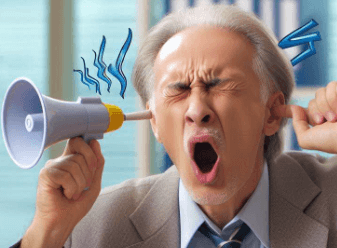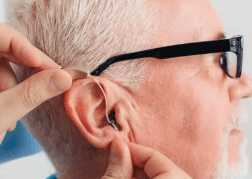High-pitch hearing loss is exactly what it sounds like – trouble hearing high-pitched sounds.
Imagine trying to catch the chirping of birds, the beeping of a microwave, or even some parts of a conversation. Yeah, it can be tricky when those higher tones just don’t come through clearly.
The basics of hearing start with sound waves entering your ear and hitting your eardrum, which then vibrates. These vibrations move through small bones in the ear and then transform into signals your brain understands. With high-pitch hearing loss, the problem usually lies in the inner ear where tiny hair cells are damaged or deteriorate over time. These cells are vital for picking up high-frequency sounds.
High-pitch hearing loss stands apart from other types of hearing issues. While some people struggle with low-pitched sounds or can’t hear anything at all, folks with high-pitched hearing loss might hear a bass drum well but find it impossible to catch a whistle or a child’s voice. It’s all about which frequencies are affected.
Understanding what high-pitch hearing loss is can help anyone better grasp why someone might need to ask you to repeat yourself or why they’re struggling to catch on during group conversations.
It’s not just about volume; it’s about the specific part of the sound spectrum that’s getting missed.
Causes of High Pitch Hearing Loss
Several factors can lead to high-pitch hearing loss. One of the most common causes is aging.

Just like our eyesight can get worse as we get older, our hearing can too. The delicate hair cells in our ears that detect sound can wear out over time, especially the ones responsible for high frequencies.
Noise exposure is another big culprit. Think about loud concerts, noisy workplaces, or even blasting music through headphones. Over time, exposing your ears to high volumes can damage those sensitive hair cells. It’s always a good idea to protect your ears if you’re around loud sounds regularly.
Genetics also plays a role. If your parents or grandparents had high-pitch hearing loss, you might be more likely to experience it too. It’s something that can run in families just like other health conditions.
Health conditions like diabetes and hypertension can also impact your hearing. These conditions affect blood flow, which can harm the tiny blood vessels in your inner ear, leading to high-pitch hearing loss. It’s essential to manage these health issues to keep your hearing sharp.
Some medications can have side effects that include hearing loss. Chemotherapy drugs, certain antibiotics, and even high doses of aspirin can harm your hearing. If you notice any changes in your hearing after starting a new medication, it’s crucial to talk to your doctor right away.
Symptoms and Detection Of High Pitch Hearing Loss
High-pitch hearing loss can sneak up on you.
Often, it starts so subtly that you might not even notice at first. However, there are signs to look out for that suggest something might be up with your hearing.
One of the main symptoms is trouble understanding conversations, especially in noisy places. You might find it hard to pick out individual words over background noise. High-pitch sounds like ‘s’ and ‘th’ can be particularly hard to catch, making speech seem muffled or unclear.

You could also notice that high-pitched everyday sounds, such as doorbells, alarms, or even birdsong, seem a bit dulled or completely missing. If people keep telling you that you’re speaking too loudly, it could be because you can’t hear your voice well anymore.
When it comes to detecting high-pitch hearing loss, paying attention to these small changes is crucial. If you find yourself frequently asking people to repeat themselves or if others mention that you seem to mishear things often, it’s time to take it seriously.
Medical professionals can perform specific hearing tests to check your hearing. These tests often involve listening to a variety of sounds through headphones and indicating when you can hear them. By measuring which frequencies you struggle with, audiologists can pinpoint high-pitch hearing loss.
Catching this type of hearing loss early can make a big difference. Addressing the issue sooner means less strain on your daily life and better solutions tailored to your needs. If you notice any of these signs, it’s wise to get a hearing test done to understand what’s going on and take appropriate action.
Recommended Reading: How To Understand Hearing Test Results.
What is a High Pitch Hearing Test?
A high-pitch hearing test is a specialized evaluation to check your ability to hear high-frequency sounds.
It plays a key role in diagnosing high-pitch hearing loss by pinpointing the exact frequencies you struggle with.
During the test, you’ll typically sit in a soundproof room and wear a set of headphones. The audiologist will play a series of tones at different pitches and volumes. Each time you hear a sound, you’ll usually press a button or raise your hand to signal that you’ve heard it. This process helps map out your hearing ability across various frequencies, highlighting any high-frequency deficits.
Interpreting the results from the test involves comparing your responses to what’s considered normal hearing levels. If you have trouble hearing high-pitched tones that others can hear easily, it’s a strong indicator of high-pitched hearing loss. The audiologist can then discuss the findings with you, explaining what they mean and what steps to take next.
Getting this test done is straightforward and can provide valuable insights. Knowing exactly where your hearing falls short can help tailor specific treatments and management strategies to improve your quality of life.
If high-pitch hearing loss is suspected, this test is an essential step in the right direction.
Treatment and Management Of High Pitch Hearing Loss
One of the most effective ways to manage high-pitch hearing loss is through hearing aids. Modern hearing aids are quite advanced and can be customized to amplify high-frequency sounds, making it easier to hear those tricky high pitches.

Another option is using other assistive listening devices, like personal amplifiers or specialized phones. These gadgets boost sound levels directly into your ear, which can make a significant difference in daily activities.
Lifestyle changes can also help manage high-pitch hearing loss. Simple steps like reducing exposure to loud noises can prevent further damage. Regular check-ups with an audiologist ensure your treatment plan stays up-to-date and effective.
Learning to lip-read or using visual cues can improve communication, making conversations smoother even with hearing loss. Joining support groups can also offer valuable tips and a sense of community.
Living with High Pitch Hearing Loss
Adapting to life with high-pitch hearing loss means finding new ways to communicate and enjoy everyday activities. Using a few smart strategies can make a big difference.
Clear communication is key. If you’re having trouble hearing, don’t hesitate to ask people to speak a bit louder or more clearly. Position yourself to see their faces so you can catch visual cues like lip movements and facial expressions.
I can tell you that after my hearing loss, I depend heavily on lip reading. During Covid time, it was tough as everybody was wearing masks. And I upgraded to a new hearing aid so that also helped him with my hearing loss.
Technology is your friend here. Many smartphones and devices come with built-in features designed to help those with hearing loss. For instance, you can turn on captions for videos or use apps that convert speech to text in real time.
Support systems play a vital role. Don’t be afraid to reach out to friends, family, or support groups. Sharing your experience and gaining insights from others who face the same challenges can be incredibly empowering.
Embrace solutions that work for you. Whether it’s using a hearing aid, learning sign language, or finding quieter places for conversation, tailor your approach to what makes your life easier and more enjoyable.
Frequently Asked Questions (FAQs) Concerning High Pitch Hearing Loss
What is high-pitch hearing loss?
High-pitch hearing loss involves difficulty hearing higher frequency sounds like birds chirping or certain speech sounds. It affects how you perceive higher tones, making some sounds seem muffled or hard to catch.
How is it diagnosed?
Diagnosis typically involves a high-pitch hearing test where different sounds are played through headphones to determine which frequencies you can’t hear well.
What are common causes?
Common causes include aging, noise exposure, genetics, health conditions like diabetes and hypertension, and certain medications.
How can it be treated?
Treatment options include hearing aids, other assistive devices, and lifestyle changes such as avoiding loud noises. Regular check-ups with an audiologist are also important.
How can I improve communication?
Strategies include asking people to speak more clearly, using visual cues, and utilizing technology like speech-to-text apps. Joining support groups for additional tips and resources can also help.
Can it get worse over time?
Yes, high pitch hearing loss can progress, especially if it’s due to ongoing factors like noise exposure. Managing the condition early and protecting your ears can slow down this progression.
Are you suffering from a hearing loss?
Feel free to reach out if you have any questions or comments. I promise to get back to you.
Regards and Take Care
Roopesh
